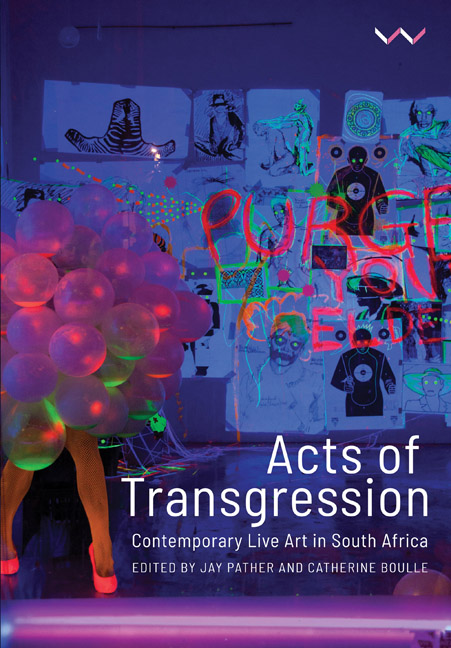Introduction
Published online by Cambridge University Press: 30 May 2019
Summary
THE TIMES
On 2 September 2014, audiences entering the Cape Town City Hall on the seventh evening of the Gordon Institute for Performing and Creative Arts (GIPCA) Live Art Festival were hit with the pungent smell of cow dung – the sensory setting of Chuma Sopotela's Inkukhu Ibeke Iqanda (‘The chicken has laid its eggs’). Sopotela's series of slow and careful ritualised acts included writing ‘Nkandla’ on the wall in dung, in reference to then President Jacob Zuma's private residence, revealed earlier that year to have been lavishly renovated with the use of public funds. In the course of the performance, Sopotela removed the South African flag from her vagina. Tebogo Munyai's Doors of Gold unfolded in an adjoining room, where the artist's naked body was foregrounded as a trope for acute vulnerability in his evocation of the Marikana massacre, but also of the erasure of black men who have died in South Africa's mines without record or ceremony. In yet another room, Limelight on Rites, by dancer and choreographer Sello Pesa, featured two performers dancing to loud music with and alongside a coffin, while others pitched funeral plans to audience members, similarly highlighting the black body as an expendable commodity for barter and trade – even in death.
These deliberate, sometimes opaque, sometimes stark gestures, and the many that preceded and followed in the Festival programme, seemed to search for a different language – a corporeal vocabulary of seepage and excess – to articulate the distension of the time. Performing states of despair and protest, attack and response, against an overwhelming onslaught on the black body by continued economic and psychic oppression, they cited the failure of systems of communication; a breakdown of language and logic.
Only six months later, Chumani Maxwele flung excrement at the statue of Cecil John Rhodes on the University of Cape Town's Upper Campus in an act of calculated political significance that was also a searing physical manifestation of emotional overflow. Dressed in black tights and a bright pink hard hat with a placard that read ‘EXHIBIT WHITE ARROGANCE @ UCT,’ Maxwele's striking intervention, as deliberate and crafted as a performance, cut through layers of obfuscation around institutional racism to give voice to an irrepressible anger and impatience at the slow pace of change in a supposedly postcolonial country.
- Type
- Chapter
- Information
- Acts of TransgressionContemporary Live Art in South Africa, pp. 1 - 16Publisher: Wits University PressPrint publication year: 2019



